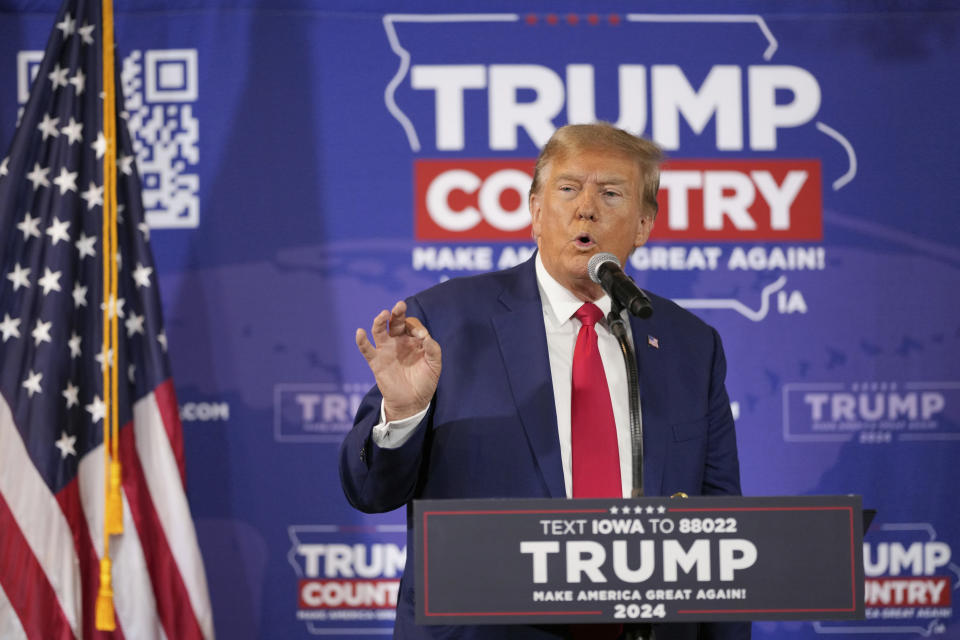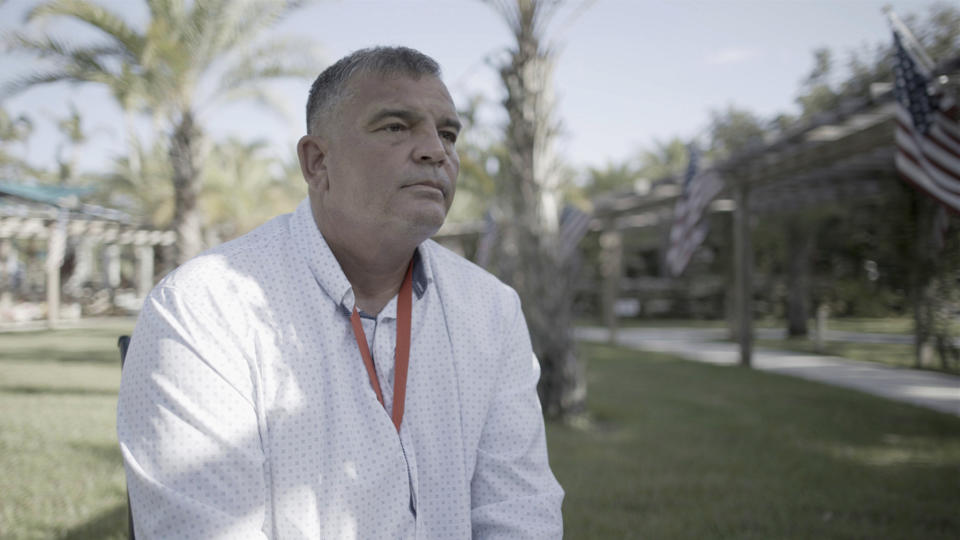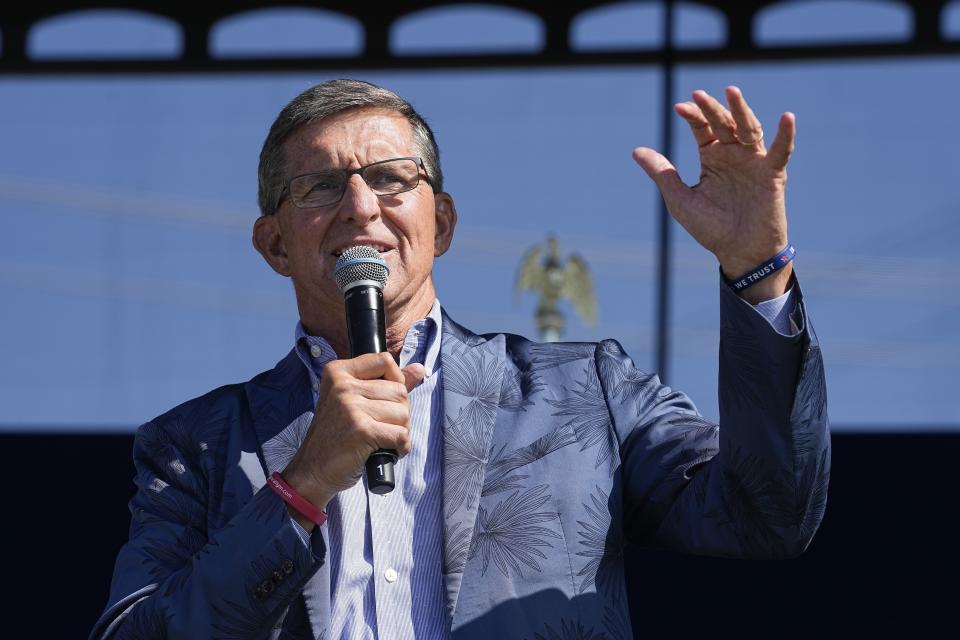Trump tells supporters, 'Guard the vote.' Here’s the phrase's backstory and why it's raising concern
- Oops!Something went wrong.Please try again later.
- Oops!Something went wrong.Please try again later.
Former President Donald Trump is urging supporters to “guard the vote” during next year's election, a phrase that has set off alarm bells among pro-democracy advocates who say it signals permission to take extreme measures that could intimidate voters and threaten election workers.
The phrase is a relatively novel one for Trump, though activists in the far-right movement have been setting the groundwork for it to be deployed more widely.
Former national security adviser Michael Flynn has spent months repeating the phrase in posts, speeches and interviews. And Victor Mellor, a close Flynn associate, told The Associated Press he has been setting up a new group called “Guard the Vote” ahead of the 2024 elections. Mellor provided AP a video that showed the group's new “command center” in a Florida building that houses Flynn's offices.
Trump employed the phrase in Ankeny, Iowa, on Saturday, saying his followers need to “guard the vote” because “we have all the votes we need.” He encouraged his supporters to “go into" cities including Detroit, Philadelphia and Atlanta to “watch those votes when they come in.”
Experts in political messaging say the context in which Trump uses “guard the vote” primes his supporters to not only expect fraud in diverse Democratic cities next year, but to intervene to ensure Trump wins.
“It suggests that the outcome of the election is foregone. It’s been decided,” said Susan Benesch, founder and executive director of the Dangerous Speech Project. “Is it actually guarding the election against fraud, or is it guarding the election against a result in which Trump is not declared the winner?”
Trump campaign spokesman Steven Cheung said that by “guard the vote,” Trump meant “to stop any instance of voter fraud in areas where fraud happens.” He did not elaborate, and didn't answer questions about whether the term referred to efforts by Flynn or Mellor.
“If he’s really talking about peaceful, normal, legitimate poll watching, then he should say that,” Benesch said.
THE BACKSTORY OF ‘GUARD THE VOTE’
The phrase “guard the vote” gained popularity in 2022 when right-wing activist groups, including one in Washington state that called itself Guard the Vote, began monitoring ballot drop boxes to try to identify fraud.
The term resurfaced earlier this year when Trump was filmed using it during a June event at his golf club in Bedminster, New Jersey, and when Flynn began pushing the term repeatedly a few weeks later.
“I was just recently with President Trump probably about two and a half weeks ago, and we talked about this idea, about guarding the vote,” Flynn said in a July 6 interview with radio host Eric Metaxas. “It means keeping an eye on every single aspect of the vote that we have from the moment it starts, whether it's 45 days or 30 days prior to the vote, all the way through the counting.”
Since then, Flynn has posted or publicly discussed guarding the vote at least eight times. In a speech in Rhode Island in September, he discussed being at ballot boxes “24/7” to videotape people dropping off ballots. In a post on X last month, he referenced “concerned citizen guards” at ballot boxes. On Telegram in July, he wrote “#WeThePeople are going to be checking on all of you and the entire election system from top to bottom, start to finish, sunup to sundown.” Flynn did not return an email seeking comment.
In general, partisan poll watchers appointed by political parties or other groups are allowed to observe voting and ballot counting but can’t interfere in the election process, according to the National Conference of State Legislatures. States have different rules governing their behavior and qualifications.
Mellor, who owns a concrete business and has been politically active in Sarasota County, Florida, told AP this week that he established a group called “Guard the Vote,” which would connect members of law enforcement and citizens to do training about elections.
Mellor said when he heard Trump use the phrase “guard the vote” on Saturday, he thought “That’s me. I’m ‘guard the vote.’”
WILL IT INSPIRE VIOLENCE?
Mellor shared few details about the group's plans but said it would involve “educated Americans, educated law enforcement."
Asked about criticism that the phrase “guard the vote” could encourage violence or endanger the election system, voters or elections workers, Mellor said it would “absolutely not. There will be no weapons. Everything done by the rule of law.”
He said there would be “zero intimidation" and that the group was not a right-wing operation. He said he was encouraging Americans of all political backgrounds to join, and that more details would be announced in the coming days.
“This isn't a militant movement. This is an educational movement,” he said, adding that it was meant to help people understand what he called a convoluted election process.
While there was no apparent connection to Mellor's effort, right-flank groups began monitoring ballot drop boxes in at least two counties in Arizona during the 2022 midterm elections before a federal judge ordered them to keep their distance from voters. Some were masked and armed, and some were associated with the far-right group Oath Keepers.
Mellor shared with AP a video of what he called his “command center” in a building he owns in Venice, Florida, that also houses Flynn’s offices and a studio where Flynn frequently does interviews.
The short video showed a large, windowless room surrounded by what appear to be concrete walls with the slogan “GUARD THE VOTE” written on one wall. At the center of the room was a long conference table surrounded by cushioned chairs, with what Mellor said was his handgun atop the table. Asked about the weapon, Mellor told AP he hadn't realized it was in the video and that the gun wasn't sending a message.
“I don't leave home without it,” he said.
Another wall displayed an oath of office, surrounded by seals and flags for the military branches. Other walls displayed maps of states including Arizona, Michigan, Pennsylvania, Nevada, Georgia, North Carolina, Alaska, Texas, Florida, Wisconsin and Minnesota.
A whiteboard displayed notes referring to strategy, including a mention of sheriffs and a list of prominent election deniers. One corner of the whiteboard reads, “Fraud Detection," followed by the words, “Don't use word fraud use election security.”
A joint investigation by AP and the PBS series “Frontline” last year detailed how Flynn had been working closely with Mellor since 2021. Mellor established a place called The Hollow and turned it into a center of activity for Proud Boys and other activists in Sarasota County’s far-right community.
Mellor, a former Marine, posted a photo on his Facebook page showing him and his son outside the U.S. Capitol on Jan. 6, 2021, and told “Frontline” that he was proud to be there that day. He told AP in October 2022 that he and Flynn are “experiencing and nurturing a true grass-roots movement in its purest form.”
“I assure you, this is only the beginning,” Mellor said then.
THE LANGUAGE OF WAR
Jennifer Mercieca, a historian of political rhetoric at Texas A&M University who wrote a book about Trump's rhetoric, said his use of the word “guard” was notable because it can be a military word, “As if you’re an army.”
“And so the framing there is interesting in that it isn’t the language of democracy and the democratic process. It’s the language of warfare,” Mercieca said. “And that’s how fascism works. You say politics is war and the enemy cheats. It’s up to us.”
She said Trump's repeated claims that there will be cheating in an election that hasn't happened yet is a way of enlisting his followers into his conspiracy theory. Trump also suggested the elections were rigged against him even before the votes in 2016 and 2020.
“You tell the population that the rules are already broken. Right? They’re so corrupt. They are such big cheaters. They are enemies. They are threats. And then you say, And it’s up to us to defend it,” Mercieca said.
What should Americans think when they hear Trump use such language?
“It’s still a part of Trump’s Jan. 6 insurrection. He’s still ‘couping,’” she said.
ELECTION OFFICIALS SAY THEY WON'T BE DETERRED
Election officials in the cities Trump named say they are committed to a safe and secure election in 2024 and won't be intimidated by Trump or anyone else.
“Detroiters are not scaredy cats. We’re not chumps, we’re not to be picked on,” said Detroit City Clerk Janice Winfrey. “So they can come if they want to, absolutely. We’re ready.”
“This is nothing new, Trump says these things before every election,” Philadelphia City Commissioners’ Chairwoman Lisa Deeley said in a statement. “In 2016, he said that they had to watch and make sure that people didn’t vote five times. In 2020, there was ‘Bad Things Happen in Philadelphia’. Each of those elections, 2016 and 2020, were completely fair and accurate and that is what we will continue to deliver in 2024.”
Jessica Corbitt, spokesperson for Georgia's Fulton County, declined to respond to Trump's targeting of Atlanta but said election safety is a concern for the county after threats to its workers. She emphasized that “polling places should be safe for everyone.”
Officials said they've taken steps to improve election security since 2020. In Detroit, for example, election officials have reinforced their building with bulletproof glass and increased security present during vote-counting.
Jena Griswold, Colorado's secretary of state, said she has led new laws to protect against election threats, including bans on threatening or doxxing election workers, tampering with election equipment, or openly carrying firearms near polling locations.
“With Donald Trump’s increasingly extreme rhetoric, he continues his attempts to undermine this nation’s free and fair elections," Griswold said. “Every state should follow our lead.”
___
The Associated Press receives support from several private foundations to enhance its explanatory coverage of elections and democracy. See more about AP’s democracy initiative here. The AP is solely responsible for all content.



